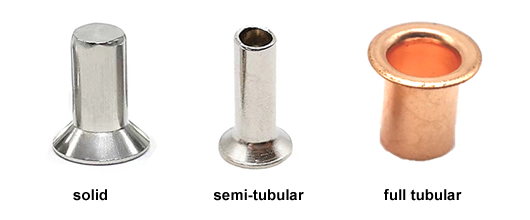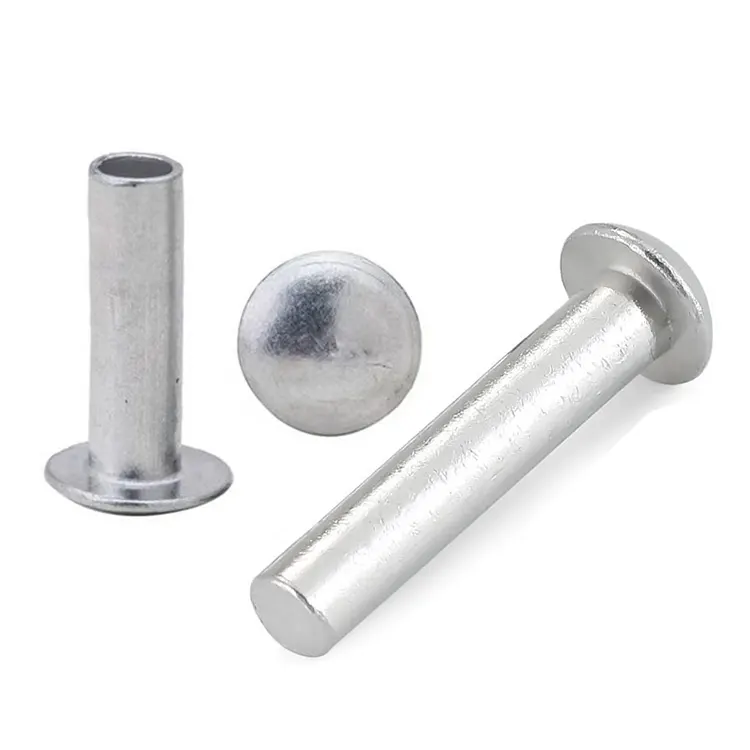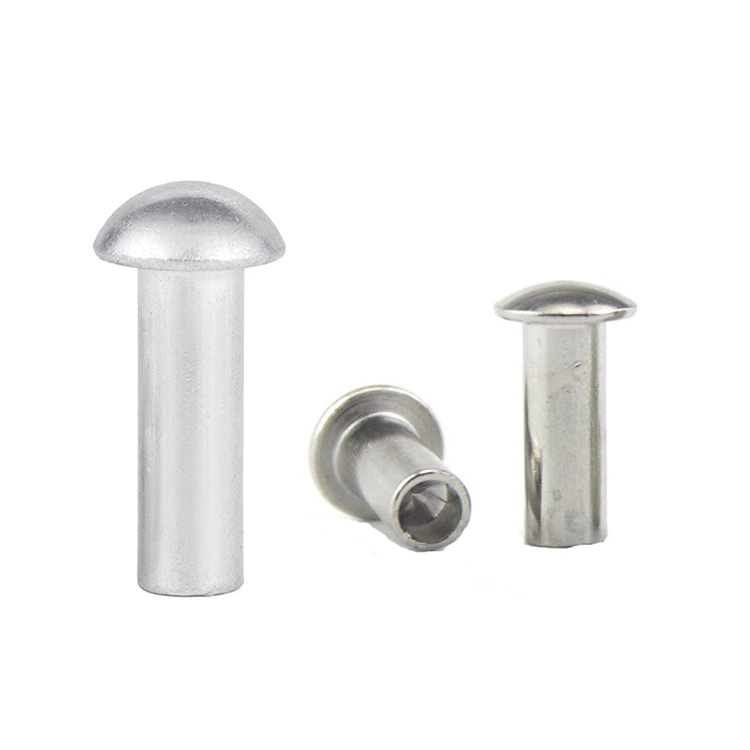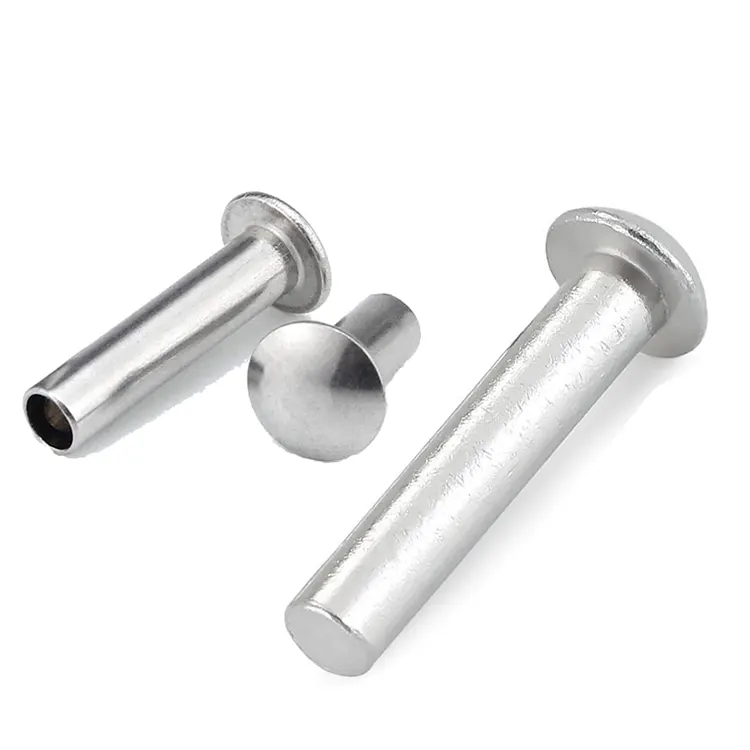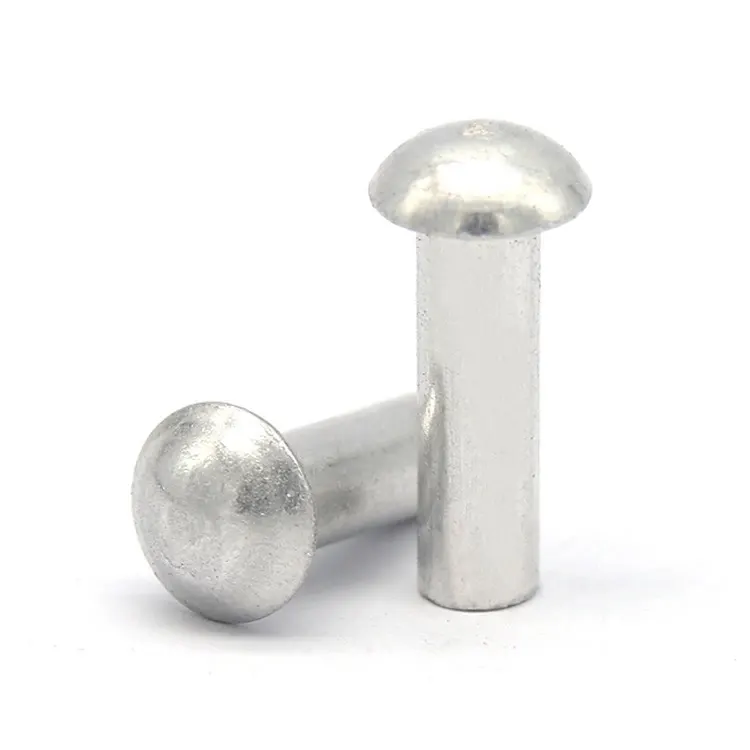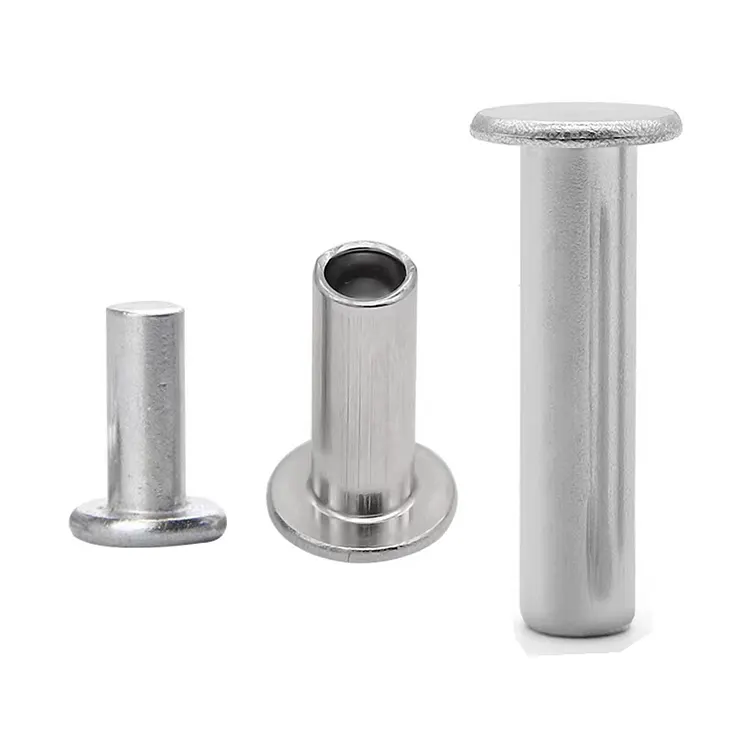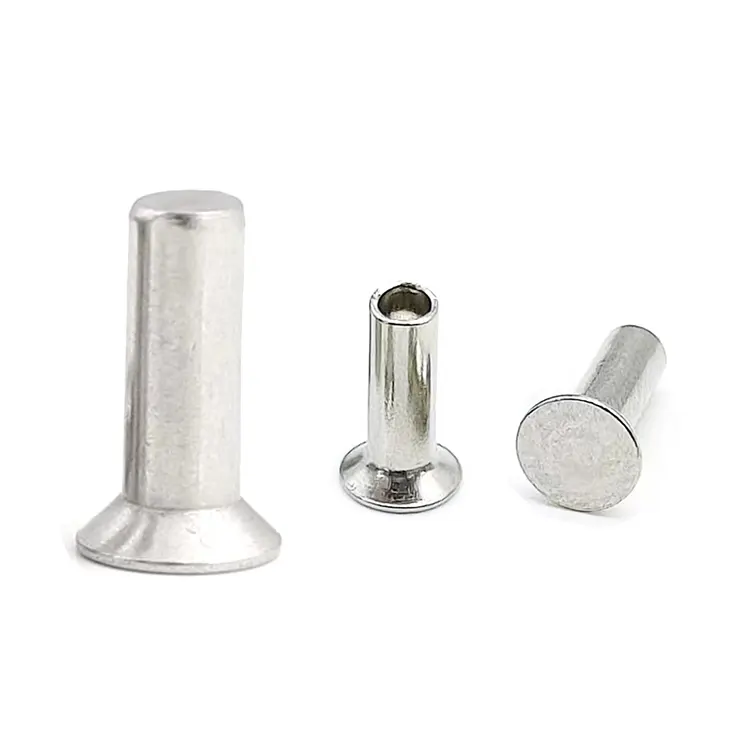Đinh tán
As one of professional manufacturer in China, Notin would like to provide you Rivets. And we will offer you the best after-sale service and timely delivery.
What is a rivet?
A rivet is a permanent mechanical fastener used to join two or more materials. Rivets work by inserting a metal pin into an aligned hole and deforming the end, creating a strong, secure, and durable connection. Unlike temporary fasteners like screws, rivets do not rely on threads, but instead form a permanent connection, making them ideal for applications requiring high strength, durability, and vibration resistance.
Classification of Rivets
Rivets are typically categorized by head shape, degree of hollowness, or material.
Based on head shape, rivets can be classified as flat head rivets, round head rivets, countersunk head rivets, mushroom head rivets, universal head rivets, truss head rivets, etc.

Based on degree of hollowness, rivets can be classified as solid rivets, semi-tubular rivets, or full tubular rivets.
Based on material, rivets can be classified as brass rivets, stainless steel rivets, steel rivets, aluminum rivets, copper rivets, etc.
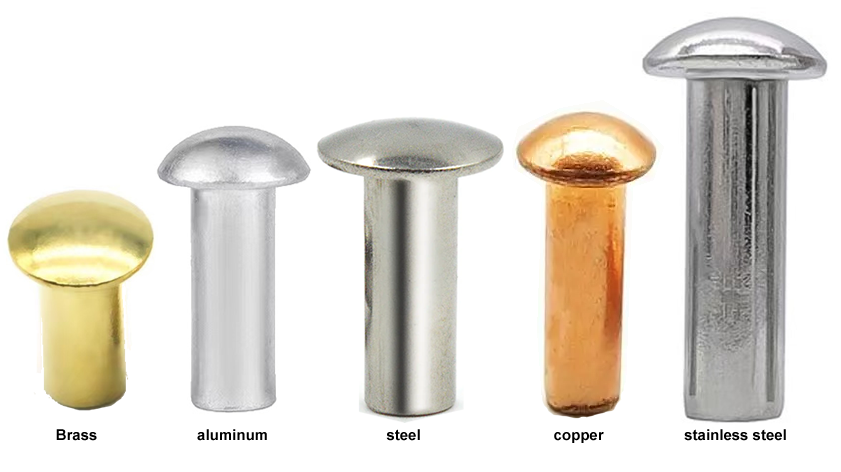
What surface finishes are available for rivets?
Rivet surfaces are typically treated with rust-proofing treatments, primarily electroplating, including zinc plating, nickel plating, chrome plating, tin plating, gold plating, and silver plating. Electroplating is a common rust-proofing method for rivets. It applies a layer of plating to the rivet surface through physical or chemical methods. The plating effectively prevents corrosion and rust, while also providing a certain aesthetic effect.
Another special surface treatment method is head coating. Head coating is performed after the rivet is electroplated. This allows for a variety of colors on the rivet head, achieving an aesthetically pleasing finish.
Aluminum rivets cannot be electroplated, but they can be anodized. Anodizing also allows for a variety of color options, but the unit price is higher than electroplating.
Rust-proofing the rivet surface is crucial, effectively extending the rivet's service life and ensuring a secure connection. Different rust-proofing methods are suitable for different environments and applications, so the choice should be tailored to the specific situation.
- View as
Đinh tán đầu tròn bằng nhôm
Đinh tán đầu tròn bằng nhôm được sử dụng rộng rãi trong nhiều lĩnh vực khác nhau do trọng lượng nhẹ, độ bền cao, khả năng chống ăn mòn và đặc tính kết nối tuyệt vời. Nuote Metals là nhà sản xuất Trung Quốc chuyên sản xuất đinh tán đầu tròn bằng nhôm. Đinh tán của chúng tôi được xuất khẩu trên toàn thế giới và chúng tôi hoan nghênh khách hàng đến thăm chúng tôi để được giải đáp.
Đọc thêmGửi yêu cầuĐinh tán nhôm
Đinh tán nhôm được sử dụng rộng rãi trong sản xuất cơ khí, xây dựng, ô tô, hàng không vũ trụ và các lĩnh vực khác. Được làm bằng nhôm nguyên khối, chúng nhẹ, chống ăn mòn và dễ gia công. Nuote Metals là nhà sản xuất đinh tán nhôm chuyên nghiệp, bao gồm đinh tán đặc và bán rỗng, cũng như các hình dạng đầu khác nhau, chẳng hạn như đầu phẳng, đầu hình vòm và đầu chìm. Chúng tôi cung cấp đầy đủ các thông số kỹ thuật và hoan nghênh các đơn đặt hàng tùy chỉnh.
Đọc thêmGửi yêu cầuĐinh tán đầu nhôm
Đúng như tên gọi, đinh tán nhôm đầu chảo là đinh tán nhôm có đầu hình chảo. So với đinh tán đầu phẳng truyền thống, đinh tán nhôm đầu chảo có độ bền cắt cao hơn và khả năng chống gãy trong quá trình tán đinh. Phương pháp tán đinh này thường được sử dụng để kết nối các bộ phận kết cấu đòi hỏi độ an toàn và bảo mật cao hơn, chẳng hạn như trong các ứng dụng máy bay và ô tô.
Đọc thêmGửi yêu cầuĐinh tán đầu nấm nhôm
Đinh tán đầu nấm bằng nhôm nhờ đặc tính nhẹ, chống ăn mòn, thẩm mỹ và thiết thực nên đóng một vai trò quan trọng trong nhiều ứng dụng. Nuote Metals, một nhà sản xuất đinh tán của Trung Quốc, chuyên sản xuất đinh tán đầu nấm bằng nhôm. Chúng tôi sở hữu hàng ngàn khuôn mẫu cho các thông số kỹ thuật đinh tán khác nhau và hơn 40 máy tán đinh, có khả năng sản xuất hàng chục triệu đinh tán mỗi ngày. Chúng tôi hoan nghênh yêu cầu của bạn.
Đọc thêmGửi yêu cầuĐinh tán đầu phẳng bằng nhôm
Đinh tán đầu phẳng bằng nhôm nguyên chất được làm bằng nhôm nguyên chất và có trọng lượng nhẹ, chống ăn mòn và dẫn điện tuyệt vời. Chúng phù hợp cho các ứng dụng thông thường, có nhu cầu thấp như đồ nội thất, thiết bị điện, xe cộ và đóng tàu. Tuy nhiên, độ bền thấp của nhôm nguyên chất khiến nó không phù hợp với các ứng dụng có tải trọng cao. Nuote Metals là nhà sản xuất đinh tán đầu phẳng bằng nhôm hàng đầu tại Trung Quốc, xuất khẩu đinh tán của chúng tôi trên toàn thế giới. Chúng tôi hoan nghênh chuyến thăm và yêu cầu của bạn.
Đọc thêmGửi yêu cầuĐinh tán đầu chìm bằng nhôm
Đinh tán đầu chìm bằng nhôm là ốc vít dùng để kết nối hai hoặc nhiều tấm mỏng. Đầu chìm của chúng cho phép chúng nằm ngang bằng với bề mặt sau khi lắp đặt, giảm thiểu các phần nhô ra và khiến chúng phù hợp cho các ứng dụng yêu cầu bề mặt nhẵn. Được làm chủ yếu bằng nhôm, những chiếc đinh tán này có trọng lượng nhẹ, chống ăn mòn và có tính dẫn điện cao, khiến chúng được sử dụng rộng rãi trong các ngành công nghiệp như hàng không, ô tô, điện tử và xây dựng.
Đọc thêmGửi yêu cầuWhat are the advantages of rivets over other fasteners?
1. Ease of Installation
Rivets are fast to install, and even fully automated for high-volume applications, resulting in a simple and efficient operation process.
2. Connection Reliability
The riveting process is standardized, with strict quality control, resulting in highly stable connections. Visual inspection allows for quick verification of connection quality.
3. Vibration and Impact Resistance
Rivets connect through deformation or interference fit, providing strong clamping force and excellent vibration resistance, capable of withstanding vibration and shock.
4. Low Cost
Rivets are easy to install and can be fully automated, saving significant labor costs.
What are the advantages and disadvantages of rivets made of different materials?
Aluminum Rivets
Advantages: Lightweight, reduces overall product weight, low cost, suitable for general civilian applications.
Disadvantages: Low tensile and shear strength, unsuitable for high-strength workpieces, prone to electrochemical corrosion when in contact with metals such as stainless steel.
Stainless Steel Rivets
Advantages: Strong corrosion resistance, high hardness, suitable for high-strength workpieces (such as marine equipment)
Disadvantages: Higher cost, typically more expensive than aluminum rivets of the same specification.
Brass and Copper Rivets
Advantages: Excellent conductivity (such as connecting electronic components), good corrosion resistance.
Disadvantages: Higher cost, more difficult to process.
Steel Rivets
Advantages: High hardness, high connection reliability, and wide applicability.
Disadvantages: Compared to other materials, iron rivets are more prone to rusting.
What are the main applications of rivets?
Rivets have a wide range of uses, from small items like a pair of scissors to large items like airplanes and ships, as well as in high-precision medical applications.
Industrial Manufacturing
Rivets are used in a wide variety of industrial fields, wherever there is a need to connect two or more materials.
Electronics
Rivets secure heat sinks and chips, providing both vibration damping and noise reduction, and are widely used in the cooling systems of electronic products such as computers and mobile phones.
Automotive
Rivets are widely used to connect components of automobile bodies and chassis, such as doors and hoods. Their lightweight and corrosion-resistant properties make them an indispensable joining method in automotive manufacturing.
Aerospace
In aircraft manufacturing, rivets are used to connect different fuselage components, such as wings and tailplanes. Millions of rivets create high-strength, corrosion-resistant joints. Aluminum and titanium alloy rivets are often used to connect components of corresponding materials, ensuring stability in extreme environments.
Rivets are used everywhere. The above examples only represent a small number of their applications. We see rivets everywhere in our daily lives, such as on scissors, folding beds, and strollers etc. Rivets can be customized to different sizes and materials depending on the application.
Nuote Metals has specialized in the rivet industry for over a decade. Our factory is located in Dongguan, a city known as the "World Factory," a city with a developed industry and convenient transportation. This allows us to respond quickly when acquiring raw materials and supporting surface treatments, meeting our customers' needs for quick access to samples and bulk orders. We produce 10 million rivets daily and have molds of various specifications, allowing us to produce rivets as small as 0.8mm and as large as 10mm. We welcome your inquiries and visits.






